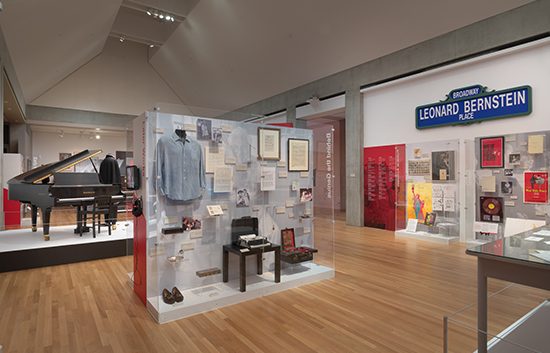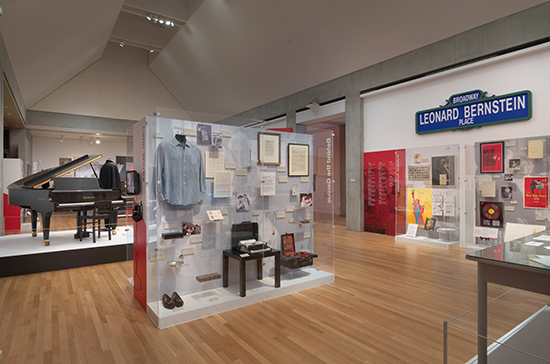Leonard Bernstein: An Icon of American Music Celebrated at the Skirball Museum A Paean to the Man and the Exhibit


The renowned pianist Arthur Rubinstein described him as a universal genius. Just to witness him on the podium conducting or on television in its early days explaining classical music to the millions one realized that. Leonard Bernstein simply exuded exuberance and talent no matter what endeavor he embarked on, be it conducting classical music; composing for the stage, the screen, or the concert hall; championing music or social justice; or educating and inspiring any and all. He is not just the embodiment of classical music in America but of the American dream and spirit as well.
It is therefore most fitting that he be honored, investigated, and celebrated at the Skirball Museum with an exhibit that certainly captures the essence of the man.
Just before entering “Leonard Bernstein at 100,” one encounters the following quote from the man himself:

“I want to conduct. I want to play the piano. I want to write for Hollywood. I want to write symphonic music. I want to keep on trying to be, in the full sense of that wonderful word, a musician. I also want to teach. I want to write books and poetry. And I think I can still do justice to them all.”
And he did! If ever a quote was emblematic of a man’s ambition, drive, and personality, this is it!
Leonard Bernstein is born in 1918 and becomes enraptured with the piano after hearing a performance, a rapture that was to last a lifetime. He takes piano lessons as a youth and begins playing entire operas and Beethoven symphonies on the piano.
However, his father discourages him from a musical career thinking he will not make enough money from it but when father and son attend their first ever symphony concert in 1932 and hear the legendary conductor Arthur Fiedler and his equally legendary Boston Pops perform Maurice Ravel’s Bolero, both are enthralled and Lennie is on his way musically. His piano teachers realize instantaneously his prodigious talents, which he further develops as a student at Harvard and the Curtis Institute. He is mentored and encouraged by eminent conductors Dimitri Mitropoulos and Serge Koussevitzky, both of whom see in him a passionate and charismatic leader of musicians. In 1943, as a 25 year old assistant conductor of the New York Philharmonic Symphony Orchestra, Bernstein seizes his opportunity and rises from the depths of anonymity to instant stardom when he is called upon to replace the illustrious but alas indisposed conductor Bruno Walter on just a few hours notice and conducts the entire program “with no signs of strain or nervousness” to “hearty applause,” according to the New York Times front page review of the concert. Thus launched, Bernstein goes on to become the first native born American to lead a major symphony orchestra in the United States, the very same gloried New York Philharmonic. Not bad for someone who only got a C in Music as a junior at the Boston Latin School! (Nota bene: I gathered all of the above facts from an assiduous study of the lovingly and meticulously preserved memorabilia of the exhibit.)

Not just the world of classical music, but the world of music and the world at large become Lenny’s targets. He conducts classical music around the world, he composes symphonies, he becomes a national figure with his educational concerts on television, he scores the music for the classic film On the Waterfront, he writes the music for the beloved play and later movie West Side Story, and he is a vocal and luminous supporter of global humanitarian causes. Bernstein didn’t just put himself on the map, he put everything he loved and supported there as well.
Based on a detailed study of the man and this exhibit, one can come to but one conclusion: Leonard Bernstein was a voracious dynamo of communication. Indeed it was communication which was his ultimate goal in all his enterprises: conducting, composing, and educating.

As a conductor, he is certainly one of the greats. Few have led an orchestra with such commitment, intensity, and brio; his performances are quite simply memorable. He is the first American conductor to achieve national and then international prominence. He is the first American conductor to conduct an opera at La Scala, in a performance with no less than the legendary Maria Callas. He was revered by the greatest orchestras in the world, including Vienna and Berlin. He is the heart and soul of the Israel Philharmonic, based on his efforts over the decades for that orchestra. He is the champion of American composers from Copeland to Piston, and is personally responsible for the resurrection of Gustav Mahler as a force on the concert stage.
As a composer, he seemed to bridge the gap between the classical and the popular; in this venue, he was a supreme communicator of various forms and styles. He is equally at home collaborating with the likes of Dave Brubeck or Jerome Robbins or Adolph Green and Betty Comden or Stephen Sondheim. He composed symphonies, piano works, choral works, ballets, musicals, and requiems, every form he tried reflecting a unique combination of his skills, interests, and appetites. He will probably be most remembered in this domain for West Side Story, but was not that a remarkable accomplishment as no one who has seen it will ever forget it!

As an educator, he is peerless. His explications of music and performances on television introduced generations to his art, and he truly believed music was the planet’s salvation. Countless students, musicians, and conductors felt his influence and imbibed his persona. He was an unrelentingly compassionate ambassador for his ideas and just to be in his presence was an education in all senses of the word.
When the Berlin Wall came down, who but Leonard Bernstein was there to lead with characteristic gusto an orchestra composed of international musicians in a memorable performance of Beethoven’s Ninth Symphony! Who else would think to substitute Freiheit! (freedom) for Freude! (joy) in the climactic Ode to Joy, stating Beethoven would most certainly have approved under the circumstances! But, then again, Leonard Bernstein truly stood with the giants, as his remarkable life so clearly illustrates. That life is on display to be studied and appreciated at the Skirball, and the exhibit should prove to be a treat and inspiration for every generation, just as Lenny would have wanted!

